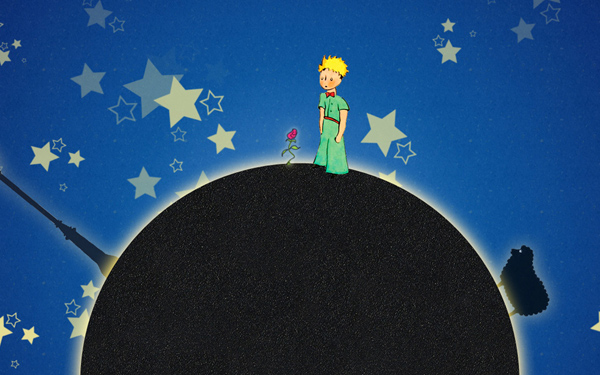當(dāng)前位置: Language Tips> 名著選讀
分享到

The fourth planet belonged to a businessman. This man was so much occupied that he did not even raise his head at the little prince's arrival.
第四個行星是一個實(shí)業(yè)家的星球。這個人忙得不可開交,小王子到來的時候, 他甚至連頭都沒有抬一下。
"Good morning," the little prince said to him. "Your cigarette has gone out."
小王子對他說:“您好。您的煙卷滅了。”
"Three and two make five. Five and seven make twelve. Twelve and three make fifteen. Good morning. Fifteen and seven make twenty-two. Twenty-two and six make twenty-eight. I haven't time to light it again. Twenty-six and five make thirty-one. Phew! Then that makes five-hundred-and-one-million, six-hundred-twenty-two-thousand, seven-hundred-thirty-one."
“三加二等于五。五加七等于十二。十二加三等于十五。早上好。十五加七, 二十二。二十二加六,二十八。沒有時間去再點(diǎn)著它。二十六加五,三十一。哎喲!一共是五億一百六十二萬二千七百三十一。”
"Five hundred million what?" asked the little prince.
“五億什么呀?”
"Eh? Are you still there? Five-hundred-and-one million-- I can't stop… I have so much to do! I am concerned with matters of consequence. I don't amuse myself with balderdash. Two and five make seven…"
“嗯?你還待在這兒哪?五億一百萬……我也不知道是什么了。我的工作很多……我是很嚴(yán)肅的,我可是從來也沒有功夫去閑聊!二加五得七……”
"Five-hundred-and-one million what?" repeated the little prince, who never in his life had let go of a question once he had asked it.
“五億一百萬什么呀?”小王子重復(fù)問道。一旦他提出了一個問題,是從來也不會放棄的。
The businessman raised his head.
這位實(shí)業(yè)家抬起頭,說:
"During the fifty-four years that I have inhabited this planet, I have been disturbed only three times. The first time was twenty-two years ago, when some giddy goose fell from goodness knows where. He made the most frightful noise that resounded all over the place, and I made four mistakes in my addition. The second time, eleven years ago, I was disturbed by an attack of rheumatism. I don't get enough exercise. I have no time for loafing. The third time-- well, this is it! I was saying, then, five -hundred-and-one millions--"
“我住在這個星球上五十四年以來,只被打攪過三次。第一次是二十二年前,不知從哪里跑來了一只金龜子來打攪我。它發(fā)出一種可怕的噪音,使我在一筆帳目中出了四個差錯。第二次,在十一年前,是風(fēng)濕病發(fā)作,因?yàn)槲胰狈﹀憻捤隆N覜]有工夫閑逛。我可是個嚴(yán)肅的人。現(xiàn)在……這是第三次!我計(jì)算的結(jié)果是五億一百萬……”
"Millions of what?"
“幾百萬什么?”
The businessman suddenly realized that there was no hope of being left in peace until he answered this question.
這位實(shí)業(yè)家知道要想安寧是無望的了,就說道:
"Millions of those little objects," he said, "which one sometimes sees in the sky."
“幾百萬個小東西,這些小東西有時出現(xiàn)在天空中。”
"Flies?"
“蒼蠅嗎?”
"Oh, no. Little glittering objects."
“不是,是些閃閃發(fā)亮的小東西。”
"Bees?"
“是蜜蜂嗎?”
"Oh, no. Little golden objects that set lazy men to idle dreaming. As for me, I am concerned with matters of consequence. There is no time for idle dreaming in my life."
“不是,是金黃色的小東西,這些小東西叫那些懶漢們胡思亂想。我是個嚴(yán)肅的人。我沒有時間胡思亂想。”
"Ah! You mean the stars?"
“啊,是星星嗎?”
"Yes, that's it. The stars."
“對了,就是星星。”
"And what do you do with five-hundred millions of stars?"
“你要拿這五億星星做什么?”
"Five-hundred-and-one million, six-hundred-twenty-two thousand, seven-hundred-thirty-one. I am concerned with matters of consequence: I am accurate."
“五億一百六十二萬七百三十一顆星星。我是嚴(yán)肅的人,我是非常精確的。”
"And what do you do with these stars?"
“你拿這些星星做什么?”
"What do I do with them?"
“我要它做什么?”
"Yes."
“是呀。”
"Nothing. I own them."
“什么也不做。它們都是屬于我的。”
"You own the stars?"
“星星是屬于你的?”
"Yes."
“是的。”
"But I have already seen a king who--"
“可是我已經(jīng)見到過一個國王,他……”
"Kings do not own, they reign over. It is a very different matter."
“國王并不占有,他們只是進(jìn)行‘統(tǒng)治’。這不是一碼事。”
"And what good does it do you to own the stars?"
“你擁有這許多星星有什么用?”
"It does me the good of making me rich."
“它們讓我富裕。”
"And what good does it do you to be rich?"
“富裕對你有什么好處?”
"It makes it possible for me to buy more stars, if any are ever discovered."
“富了就可以去買別的星星,如果有人發(fā)現(xiàn)了別的星星的話。”
"This man," the little prince said to himself, "reasons a little like my poor tippler…"
小王子自言自語地說:“這個人想問題有點(diǎn)像那個酒鬼一樣。”
Nevertheless, he still had some more questions.
可是他又提了一些問題:
"How is it possible for one to own the stars?"
“你怎么能占有星星呢?”
"To whom do they belong?" the businessman retorted, peevishly.
“那么你說星星是誰的呀?”實(shí)業(yè)家不高興地頂了小王子一句。
"I don't know. To nobody."
“我不知道,不屬于任何人。”
"Then they belong to me, because I was the first person to think of it."
“那么,它們就是我的,因?yàn)槭俏业谝粋€想到了這件事情的。”
"Is that all that is necessary?"
“這就行了嗎?”
"Certainly. When you find a diamond that belongs to nobody, it is yours. When you discover an island that belongs to nobody, it is yours. When you get an idea before any one else, you take out a patent on it: it is yours. So with me: I own the stars, because nobody else before me ever thought of owning them."
“那當(dāng)然。如果你發(fā)現(xiàn)了一顆沒有主人的鉆石,那么這顆鉆石就是屬于你的。當(dāng)你發(fā)現(xiàn)一個島是沒有主的,那么這個島就是你的。當(dāng)你首先想出了一個辦法,你就去領(lǐng)一個專利證,這個辦法就是屬于你的。既然在我之前不曾有任何人想到要占有這些星星,那我就占有這些星星。”
"Yes, that is true," said the little prince. "And what do you do with them?"
“這倒也是。可是你用它們來干什么?”小王子說。
"I administer them," replied the businessman. "I count them and recount them. It is difficult. But I am a man who is naturally interested in matters of consequence."
“我經(jīng)營管理這些星星。我一遍又一遍地計(jì)算它們的數(shù)目。這是一件困難的事。但我是一個嚴(yán)肅認(rèn)真的人!”
The little prince was still not satisfied.
小王子仍然還不滿足,他說:
"If I owned a silk scarf," he said, "I could put it around my neck and take it away with me. If I owned a flower, I could pluck that flower and take it away with me. But you cannot pluck the stars from heaven…"
“對我來說,如果我有一條圍巾,我可以用它來圍著我的脖子,并且能帶走它。我有一朵花的話,我就可以摘下我的花,并且把它帶走。可你卻不能摘下這些星星呀!”
"No. But I can put them in the bank."
“我不能摘,但我可以把它們存在銀行里。”
"Whatever does that mean?"
“這是什么意思呢?”
"That means that I write the number of my stars on a little paper. And then I put this paper in a drawer and lock it with a key."
“這就是說,我把星星的數(shù)目寫在一片小紙頭上,然后把這片紙頭鎖在一個抽屜里。”
"And that is all?"
“這就算完事了嗎?”
"That is enough," said the businessman.
“這樣就行了。”
"It is entertaining," thought the little prince. "It is rather poetic. But it is of no great consequence."
小王子想道:“真好玩。這倒蠻有詩意,可是,并不算是了不起的正經(jīng)事。”
On matters of consequence, the little prince had ideas which were very different from those of the grown-ups.
關(guān)于什么是正經(jīng)事,小王子的看法與大人們的看法非常不同。他接著又說:
"I myself own a flower," he continued his conversation with the businessman, "which I water every day. I own three volcanoes, which I clean out every week (for I also clean out the one that is extinct; one never knows). It is of some use to my volcanoes, and it is of some use to my flower, that I own them. But you are of no use to the stars…"
“我有一朵花,我每天都給她澆水。我還有三座火山,我每星期把它們?nèi)即驋咭槐椤_B死火山也打掃。誰知道它會不會再復(fù)活。我擁有火山和花,這對我的火山有益處,對我的花也有益處。但是你對星星并沒有用處……”
The businessman opened his mouth, but he found nothing to say in answer. And the little prince went away.
實(shí)業(yè)家張口結(jié)舌無言以對。于是小王子就走了。
"The grown-ups are certainly altogether extraordinary," he said simply, talking to himself as he continued on his journey.
在旅途中,小王子只是自言自語地說了一句:“這些大人們真是奇怪極了。”
(來源:愛詞霸 編輯:丹妮)
上一篇 : 《長腿叔叔》第三章(上)
下一篇 :
分享到
關(guān)注和訂閱


關(guān)于我們 | 聯(lián)系方式 | 招聘信息
電話:8610-84883645
傳真:8610-84883500
Email: languagetips@chinadaily.com.cn